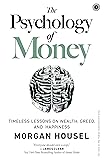Highlights from "The Psychology of Money"
By Morgan Housel

So all of us—you, me, everyone—go through life anchored to a set of views about how money works that vary wildly from person to person. What seems crazy to you might make sense to me.
We all think we know how the world works. But we’ve all only experienced a tiny sliver of it.
Not intelligence, or education, or sophistication. Just the dumb luck of when and where you were born.
Luck and risk are both the reality that every outcome in life is guided by forces other than individual effort. They are so similar that you can’t believe in one without equally respecting the other.
You are one person in a game with seven billion other people and infinite moving parts. The accidental impact of actions outside of your control can be more consequential than the ones you consciously take.
Risk and luck are doppelgangers.
The difficulty in identifying what is luck, what is skill, and what is risk is one of the biggest problems we face when trying to learn about the best way to manage money.
But realize that not all success is due to hard work, and not all poverty is due to laziness.
There is no reason to risk what you have and need for what you don’t have and don’t need.
Modern capitalism is a pro at two things: generating wealth and generating envy. Perhaps they go hand in hand; wanting to surpass your peers can be the fuel of hard work. But life isn’t any fun without a sense of enough. Happiness, as it’s said, is just results minus expectations.
Warren Buffett’s net worth is $84.5 billion. Of that, $84.2 billion was accumulated after his 50th birthday.
Optimism is usually defined as a belief that things will go well. But that’s incomplete. Sensible optimism is a belief that the odds are in your favor, and over time things will balance out to a good outcome even if what happens in between is filled with misery.
“It’s not whether you’re right or wrong that’s important,” George Soros once said, “but how much money you make when you’re right and how much you lose when you’re wrong.” You can be wrong half the time and still make a fortune.
Money’s greatest intrinsic value—and this can’t be overstated— is its ability to give you **control over your time**.
Take it from those who have lived through everything: Controlling your time is the highest dividend money pays.
in reality those other people often bypass admiring you, not because they don’t think wealth is admirable, but because they use your wealth as a benchmark for their own desire to be liked and admired.
Wealth is financial assets that haven’t yet been converted into the stuff you see.
But the way to be rich is to spend money you have, and to not spend money you don’t have. It’s really that simple.”
Learning to be happy with less money creates a gap between what you have and what you want—similar to the gap you get from growing your paycheck, but easier and more in your control.
Saving is a hedge against life’s inevitable ability to surprise the hell out of you at the worst possible moment.
Margin of safety—you can also call it room for error or redundancy—is the only effective way to safely navigate a world that is governed by odds, not certainties.
The ability to do what you want, when you want, for as long as you want, has an infinite ROI.
You can’t prepare for what you can’t envision.
Some of the most miserable workers I’ve met are people who stay loyal to a career only because it’s the field they picked when deciding on a college major at age 18.
Like everything else worthwhile, successful investing demands a price. But its currency is not dollars and cents. It’s volatility, fear, doubt, uncertainty, and regret—all of which are easy to overlook until you’re dealing with them in real time.
Tell someone that everything will be great and they’re likely to either shrug you off or offer a skeptical eye. Tell someone they’re in danger and you have their undivided attention.
Expecting things to be great means a best-case scenario that feels flat. Pessimism reduces expectations, narrowing the gap between possible outcomes and outcomes you feel great about.
I am just as susceptible to explaining the world through the limited set of mental models I have at my disposal.
Being able to wake up one morning and change what you’re doing, on your own terms, whenever you’re ready, seems like the grandmother of all financial goals.
Then the 1950s came around and we suddenly realized,